Communication
Communication is the process of exchanging information, ideas, thoughts, and feelings. It is essential for all living organisms and is crucial for the functioning of society and the world at large.
Types of Communication
There are several types of communication, including:
- Verbal Communication: This involves the use of spoken or written words to convey a message.
- Nonverbal Communication: This includes body language, facial expressions, gestures, and other nonverbal cues.
- Visual Communication: This involves the use of visual aids such as charts, graphs, and images to convey information.
- Interpersonal Communication: This is the exchange of information between two or more people.
- Mass Communication: This involves the dissemination of information to a large audience through mass media such as television, radio, and the internet.
Elements of Communication
Effective communication involves several key elements:
- Sender: The person or entity sending the message.
- Message: The information being conveyed.
- Channel: The medium through which the message is transmitted, such as face-to-face, telephone, email, or social media.
- Receiver: The person or entity receiving the message.
- Feedback: The response or reaction to the message from the receiver.
Barriers to Communication
There are several barriers that can hinder effective communication:
- Physical Barriers: These include distance, noise, and other environmental factors that can disrupt communication.
- Psychological Barriers: These include preconceived notions, biases, and emotional barriers that can affect how a message is received.
- Cultural Barriers: Differences in language, customs, and norms can impact communication between individuals from different cultures.
- Language Barriers: Differences in language and dialects can create misunderstandings and hinder effective communication.
Importance of Communication
Effective communication is crucial for various aspects of life, including:
- Personal Relationships: Clear and open communication is essential for healthy relationships with family, friends, and partners.
- Professional Success: Strong communication skills are vital for success in the workplace, including teamwork, leadership, and customer interactions.
- Conflict Resolution: Effective communication is essential for resolving conflicts and misunderstandings in various settings.
- Information Sharing: Communication allows for the exchange of knowledge, ideas, and innovations, driving progress and development.
Study Tips
To improve your understanding of communication, consider the following study tips:
- Practice Active Listening: Pay attention to verbal and nonverbal cues when communicating with others.
- Observe Communication in Different Settings: Pay attention to how communication varies in interpersonal, professional, and mass communication contexts.
- Study Communication Models: Familiarize yourself with communication models such as the Shannon-Weaver model or the transactional model to understand the communication process.
- Explore Cultural Communication: Learn about the impact of culture on communication and the strategies for effective cross-cultural communication.
- Practice Constructive Feedback: Develop the skill of providing constructive feedback to improve communication effectiveness.
◂Science Worksheets and Study Guides Eighth Grade. Volcanoes
Worksheet/Answer key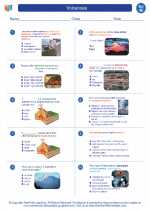 Volcanoes
Volcanoes  Worksheet/Answer key
Worksheet/Answer key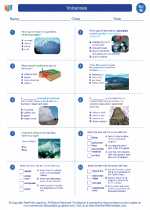 Volcanoes
Volcanoes  Worksheet/Answer key
Worksheet/Answer key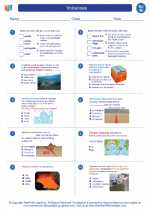 Volcanoes
Volcanoes  Vocabulary/Answer key
Vocabulary/Answer key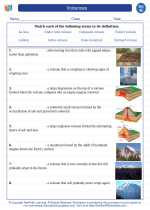 Volcanoes
Volcanoes  Vocabulary/Answer key
Vocabulary/Answer key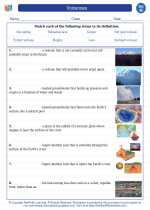 Volcanoes
Volcanoes  Vocabulary/Answer key
Vocabulary/Answer key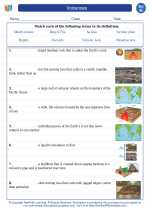 Volcanoes
Volcanoes 

 Worksheet/Answer key
Worksheet/Answer key
 Worksheet/Answer key
Worksheet/Answer key
 Vocabulary/Answer key
Vocabulary/Answer key
 Vocabulary/Answer key
Vocabulary/Answer key
 Vocabulary/Answer key
Vocabulary/Answer key

The resources above cover the following skills:
Earth/Space Science: Students will use scientific skills and processes to explain the chemical and physical interactions (i.e., natural forces and cycles, transfer of energy) of the environment, Earth, and the universe that occur over time.
Earth History: Explain how sedimentary rock is formed periodically, embedding plant and animal remains and leaving a record of the sequence in which the plants and animals appeared and disappeared.
Explain how sedimentary rock buried deep enough may be reformed by pressure and heat and these reformed rock layers may be forced up again to become land surface and even mountains.